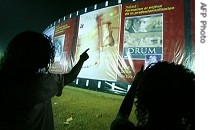2007年VOA标准英语-Largest African Film Festival Attracts Internat(在线收听)
Dakar
03 March 2007
Africa's largest film festival closes tonight in Ouagadougou, Burkina Faso. The Pan African Film and Television festival, known as FESPACO, showed films from more than 40 countries, including a growing selection of films made by non-Africans. Phuong Tran has more from VOA's West Africa Bureau in Dakar on how some of these filmmakers are finding their way into African cinema. Additional reporting was done by Zoumana Wonogo in Ouagadougou.
 |
| People look at FESPACO festival movie posters, 28 Feb 2007 |
"I got the idea of making the film last FESPACO 2005," she said. "I wanted to come back and have my own film here. I want to make the audience understand why people like me come back to this part of the world."
Nilsson says no matter how close she became to the people in her film, she was still the outsider, or "Toubab," a word for foreigners in West and Central Africa.
French film critic Jean Roy says as more international filmmakers become interested in Africa, the reaction from African filmmakers has been mixed.
"Sometimes African filmmakers should do these kinds of subjects themselves, but they do not have the money," he said. "They do not really appreciate that some other people get involved in their stories even if it brings money in the country."
However, Roy says there is a need for more films about Africa, no matter who makes them.
Among the 32 films by non-Africans chosen for special viewing, French filmmakers lead the group with 10 films. Roy says France offers financial help to its filmmakers who make films about Africa.
"From a cultural point of view, it is not that they [the French government] think the film will recover the [cost]," he added. "It is that they think that France should have this kind of policy of protecting and helping culture in Africa, because we have a common past. We have colonized these countries."
Ardiouma Soma is the chairman of the FESPACO selection committee who helped select this year's non-African produced films.
Soma says an international film is chosen either because committee members discover it, or because another film festival recommends it. Filmmakers can also submit their films directly to the committee.
After each festival, Soma says the committee searches for new films still in production. Some of these films are chosen even before completion to be included in the next FESPACO festival, held every two years.
The selection committee chair says only African filmmakers can compete in the six competition categories with cash prizes.
However, Soma says this does not discourage non-African filmmakers from trying to enter their films into the festival.
Soma says what is most important about FESPACO is not its cash prizes, the biggest of which is $20,000, small by festival standards. He says FESPACO is a center of communication in the film world and other countries want to be a part of that dialogue to promote their films.
Some non-African produced feature films showed a barge's trip down the Congo River, an Afro-Uruguayan street child, teenagers seeking asylum in England, African religions in Brazil, and corruption in Sierra Leone's diamond mining sector.